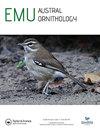Rodent predation and specialised avian habitat requirements drive extinction risk for endemic island songbirds in the south-west Pacific
IF 1.1
4区 生物学
Q3 ORNITHOLOGY
引用次数: 1
Abstract
ABSTRACT Island endemic birds represent approximately 90% of contemporary avian extinctions globally. Introduced predators and land-use change are key drivers of population decline in this group. Where multiple threats may compound the impacts on species, the implementation of complementary approaches to threat assessment can be especially valuable. Using Norfolk Island (NI) in the south-west Pacific as an exemplar, we assessed daily nest survival rates for five endemic songbirds (NI Robin Petroica multicolor, NI Gerygone Gerygone modesta, Slender-billed White-eye Zosterops tenuirostris, NI Whistler Pachycephala pectoralis xanthoprocta and NI Fantail Rhipidura albiscapa pelzelni), monitoring 135 nests over four breeding seasons. To understand the factors associated with suitable breeding habitat, we also conducted ecological niche modelling in Maxent for all species. Depredation was the primary driver of nest failure across all species (80% of failed nests), with invasive rats (Rattus sp.) being the most common predator (61% of depredated nests) and a key predictor of nest survival. Gerygones and Fantails exhibited the highest nest survival and were also categorised as habitat generalists using ecological niche modelling. Conversely, the three species that exhibited lower nest survival (Robin, White-eye and Whistler) had specialised habitat requirements, highlighting the potential for cumulative impacts. Our data suggest that invasive rodent control within intact forested sites is a critical management action for this system, followed by strategic habitat restoration and increased connectivity. Our study provides essential ecological information for five poorly understood island songbirds and identifies key management strategies for a regional avian hotspot.啮齿动物捕食和特殊鸟类栖息地的需求导致西南太平洋特有岛屿鸣禽面临灭绝风险
岛屿特有鸟类约占全球当代鸟类灭绝的90%。引入捕食者和土地利用变化是这一群体人口减少的主要驱动因素。在多种威胁可能加剧对物种的影响的情况下,实施补充性的威胁评估方法可能特别有价值。以西南太平洋诺福克岛(NI)为例,在4个繁殖季节对135个巢进行监测,评估了5种特有鸣禽(NI多色知更鸟、NI格里格尼格里格尼德斯特、NI细嘴白眼短尾带尾、NI厚头带尾、NI白尾带尾)的日巢存活率。为了了解与适宜繁殖生境相关的因素,我们还在Maxent对所有物种进行了生态位建模。掠夺是所有物种巢巢失败的主要原因(80%的巢巢失败),入侵鼠(Rattus sp.)是最常见的捕食者(61%的巢巢被破坏),也是巢存活的关键预测因素。根据生态位模型,黄尾鼠和扇尾鼠的巢存活率最高,并被归为生境通用型。相反,三种表现出较低巢穴存活率的物种(知更鸟,白眼和惠斯勒)有特殊的栖息地要求,突出了累积影响的潜力。我们的数据表明,在完整的森林场地内控制入侵啮齿动物是该系统的关键管理行动,其次是战略性栖息地恢复和增加连通性。我们的研究为五种鲜为人知的岛屿鸣禽提供了重要的生态信息,并确定了区域鸟类热点的关键管理策略。
本文章由计算机程序翻译,如有差异,请以英文原文为准。
求助全文
约1分钟内获得全文
求助全文
来源期刊

Emu-Austral Ornithology
生物-鸟类学
CiteScore
2.00
自引率
7.70%
发文量
33
审稿时长
>12 weeks
期刊介绍:
Emu – Austral Ornithology is the premier journal for ornithological research and reviews related to the Southern Hemisphere and adjacent tropics. The journal has a long and proud tradition of publishing articles on many aspects of the biology of birds, particularly their conservation and management.
 求助内容:
求助内容: 应助结果提醒方式:
应助结果提醒方式:


